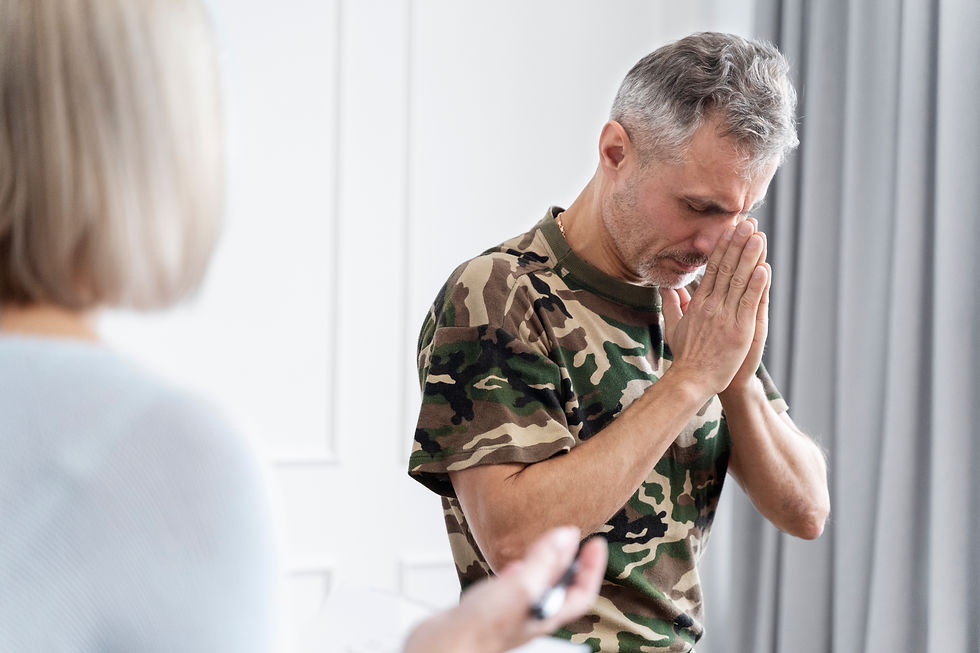A Practical Guide to Managing PTSD Symptoms Daily
- stevenflintlcsw
- Sep 3, 2025
- 4 min read

Did you know that approximately 6% of U.S. adults will experience PTSD at some point in their lives, with about 5% affected in any given year?
These numbers highlight just how common and impactful PTSD can be, affecting millions of individuals' ability to function at work, home, and socially.
At San Antonio Authentic Counseling, we understand the challenges of living with PTSD. Our trauma-informed care and evidence-based therapies, like Cognitive Behavioral Therapy (CBT) and Eye Movement Desensitization and Reprocessing EMDR, are designed to help you regain control and find peace. Let us guide you on your journey to healing.
What Is PTSD and What Triggers It?
PTSD is a mental health condition that can develop after experiencing or witnessing a severe traumatic event. These events can vary widely—from combat exposure and physical assault to accidents and childhood abuse. However, not everyone exposed to trauma develops this condition, and the symptoms can manifest differently for everyone.
Common PTSD triggers include:
Flashbacks of the traumatic event
Loud noises or sudden movements
Specific places or people connected to the trauma
Smells or songs that bring back difficult memories
Symptoms might show up as nightmares, heightened anxiety, emotional numbness, or avoidance of certain situations. Being aware of these patterns is an important first step in managing symptoms.
Actionable Coping Strategies for Daily Life
Managing PTSD doesn’t mean you have to overhaul your entire life at once. Small, manageable changes can have a big impact on your mental health over time. Here are seven strategies you can try:
1. Grounding Techniques
When overwhelming feelings strike, grounding can help bring you back to the present moment.
Try focusing on your surroundings by naming five things you can see, four you can touch, three you can hear, two you can smell, and one you can taste. This technique is simple but powerful in reducing anxiety quickly.
2. Practice Mindfulness
Mindfulness helps you stay centered and avoid getting carried away by distressing memories or worries about the future. Mindfulness-based stress reduction (MBSR) is particularly effective for battle fatigue.
Start small, like taking five deep breaths, or use guided meditation apps like Calm or Insight Timer.
3. Maintain a Routine
Creating structure in your day can offer a sense of control when life feels chaotic. Having consistent meal times, sleep schedules, and even carving out space for hobbies can help lower stress.
4. Engage in Cognitive Behavioral Exercises
Cognitive Behavioral Therapy (CBT) helps individuals recognize and reframe negative thought patterns that fuel PTSD symptoms. Even outside a professional session, you can practice writing down troubling thoughts and challenging their accuracy.
5. Exercise Regularly
Physical activity is proven to decrease anxiety and improve mood. You don’t need an intense workout plan—simple activities like walking or stretching can release feel-good endorphins.
6. Avoid Known Triggers
While long-term therapy focuses on desensitizing certain triggers, avoiding them in the short term can provide relief. For instance, if crowded spaces trigger anxiety, start with smaller, less overwhelming contexts before gradually increasing your exposure.
7. Build Your Comfort Toolkit
Prepare a personal toolkit for stressful moments. This might include calming activities like journaling, listening to soothing music, or aromatherapy with scents like lavender.
The Role of Therapy in PTSD Recovery
Although these coping strategies are helpful, professional therapy offers tailored tools for long-term healing. Evidence-based treatments like Cognitive Behavioral Therapy (CBT) and Eye Movement Desensitization and Reprocessing (EMDR therapy) address both the emotional and cognitive aspects.
Therapy can:
Help you process traumatic memories in a safe space
Teach you effective techniques for managing triggers
Support your long-term emotional resilience
At San Antonio Authentic Counseling, we offer trauma-informed care that prioritizes your comfort and healing. Whether you’re interested in cognitive approaches or EMDR, our goal is to provide therapeutic methods uniquely suited to your needs.
Local Resources in San Antonio
If you’re in the San Antonio area, help is closer than you think. Here are some support groups and resources available locally:
San Antonio PTSD Support Group
Join others facing similar challenges in a safe, judgment-free space. A quick online search can connect you to active groups near you.
The Center for Health Care Services
This organization offers trauma therapies and other mental health services for individuals struggling with PTSD.
Veterans Affairs (VA) PTSD Help Programs
If you’re a veteran, the VA offers specialized programs to help with recovery.
San Antonio Family Endeavors
They provide counseling support for individuals and families, focusing on emotional trauma treatment.
Local resources like these can play a vital role in supplementing individual therapy by offering community and additional support.
Why Choose San Antonio Authentic Counseling?
What sets San Antonio Authentic Counseling apart is our deeply personalized, trauma-informed approach.
Every client receives a care plan tailored to their unique story, combining proven methods like CBT and EMDR with compassionate support at every step. We’re more than therapists—we’re allies in your recovery and well-being.
Ready to reclaim your peace of mind? Reach Out Today and let us walk beside you as you build a stronger, calmer future.
Source:




Comments